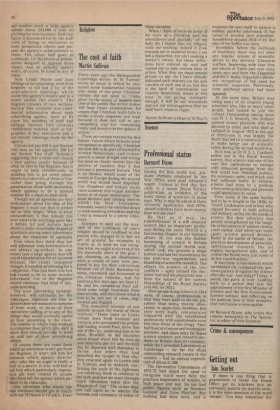Science
Professional status
Bernard Dixon
During the first world war, graduate chemists employed by the War Office were paid labourer's wages. Curious to find this fact cited, in a recent Royal Society. publication, as evidence of the lowly status of scientists in those days. Why, it may be asked in these viciously egalitarian mid-1970s, should scientists have more money than anyone else? • Be that as it may, the transformation of a still amateur science into an important profession during the years 1914-18 is A fascinating chapter in our national affairs. So too was the further harnessing of science in Britain during the second world war, which took the process a stage further and laid the foundations for the post-war organisation and financing of scientific research. The effects on science of the two conflicts — aptly termed the chemists' war and the physicists' war — form the subject of the current Proceedings of the Royal Society (vol 342, no 1631).
Most people doing science in 1914 were, of course, professionals in that they were paid to do the job, rather than being merely dilettantes or spare-time dabblers. But they were badly remunerated compared with the established professions, with emoluments even less than those of the clergy. They had insecure tenure and inadequate pensions. And there were far fewer science students and research students in Britain than, in Germany, while the Cavendish Laboratory at Cambridge — by far the most outstanding research centre in the country — had an annual expenditure of about £1,500.
The Devonshire Commission of 1872-75 had Urged the need to recognise much more fully the practical importance of science, in' both peace and war. So too had public figures such as Norman
Lockyer and Lyon Playfair. But nothing ' had been done, and it
required the war itself to hasten a sudden, panicky awareness of the value of science and scientists. Somewhere around 1915 or 16, the idea of the boffin was born.
Incredibly, before the outbreak of hostilities, there was not even any regular system of scientific advice to the services. Chemical warfare, beginning with that first gas attack at Ypres just over sixty years ago, and then the Zeppelins and the U-boats, triggered a phrenetic recognition of the need for scientific expertise. Previously, even proffered advice had been ignored. At the same time, Britain waslosing many of its creative young scientists who, like so many other people, had rushed to join the colours. Outstanding among them was H. J. G. Moseley, the brilliant pioneer atomic physicist who was allowed to enlist and who died at Gallipoli in August 1915 at the age of thirty-one. It was largely ' his death that led to a conscious policy to make better use of scientific talent during the second world war.
So it was, as Dr D. S. L. Cardwell points out in the Royal Society survey, that science was one of the very few institutions to emerge with enhanced prestige from the first 'world war. National politics, the economic order, and much else had suffered badly in esteem; science had risen to a position where even politicians and generals could appreciate its value.
True, some of the same battles had to be re-fought in the 1930s, by Tizard, Lindemann and others who argued fervently in both political and military circles for the needs of science. But their advocacy was greatly strengthened by the tangible achievements of science twenty years earlier. And when war came again, science proved decisive. Radar in the battle of Britain, the practical development of penicillin, operational research, the jet engine, navigational aids, and of course the Bomb were just some of its key contributions.
It was these achievements which established the comparatively generous pattern of support for science after the war. And today? Today, it seems, the party is over. Looking back to a period that saw the appointment of the first Minister of Science and the first Government Science Adviser, and reflecting on the position now in both domains, that conclusion is inescapable. •
Dr Bernard Dixon, who writes this column fortnightly in The Spectator, is editor of New Scientist
agonised writhing of officials when convicted train robber Charlie Wilson went 'awol' from HMP Winson Green in 1964; and the apoplectic fits that were publicly acted out when his erstwhile colleague Ronald Biggs took a powder from Wandsworth a few months later.
You almost certainly remember the time George Blake emigrated without authority from Wormwood Scrubs to Moscow, and the naked panic which seized Whitehall and caused them to appoint the Governor of the Isle of Wight to preside over an inquiry into the whole escape business. And the even greater panic which seized them when Mountbatten actually produced a report which, without mincing words, said things that needed to be said and made recommendations that needed to be made. (Needless to say, of course, they didn't act on the more vital bits of the report, the tradition of ministerial responsibility was abrogated with the full authority of Harold Wilson, and the only head that fell was that of a senior civil servant who was 'retired early'.) Well, since then we haven't heard a great deal about escapes simply because there haven't been many and those that have taken place have failed to capture the public imagination.
And that's exactly the way the Home Office 'want it. But at the same time they don't want to be seen to be sitting back, resting secure on their new-fangled security systems, and doing nothing to research into the possibilities. So research — of a sort — they have done.
Absconding from Open Prisons (HMSO 95p) is an absolutely splendid document which tells us very little that we didn't know before and draws conclusions so predictable that they'd have been obvious to a drunken nitwit lost on Dartmoor in a snowstorm.
Did you know — or could you have guessed — for instance, that the increased criminality of people received into prison is one of the reasons for the declining proportion Of prisoners eligible to be sent to open prisons? Or that remarkably few men do abscond considering how easy it is for them to do so?
Or that those who ran away did little harm?
Or that the actions of those who did run away and commit other offences while at large constituted a nuisance rather than a danger?
Now if you didn't know — or couldn't have guessed — then this publication is obviously for you. But I have a duty to warn you that it makes pretty turgid reading, that to get full value for your 95p you'll need at least another forty books for reference purposes, and that you'll probably end up hooked on booze and praying for some notorious gang,ster to escape from the top security wing at Parkhurst just to break the monotony.
You might even feel like fixing a reception for, him in the House of Lords. With Lord Longford in the chair.
Now that would matke this column .



































 Previous page
Previous page